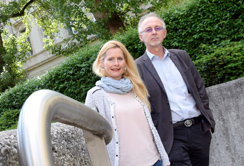Innsbruck study on aluminium and breast cancer published
- First case-control study on use of antiperspirant deodorants with tissue samples
- Participants: 209 breast cancer patients and a healthy control group of the same size
- No all-clear for the use of deodorants containing aluminium salts
An epidemiological study conducted at the Medical University of Innsbruck has delivered new findings about whether aluminium salts in deodorants represent a risk factor for the development of breast cancer. Published in the journal EBioMedicine, the results indicate that very frequent use of underarm cosmetics – in other words, several times a day – at a young age can increase the risk of breast cancer in later life.
Innsbruck, 9 June 2017: Many women are highly concerned about whether the use of deodorants containing aluminium salts increases their risk of developing breast cancer. “We wanted to provide clarity, so we surveyed 209 patients with breast cancer and a 1:1 age-matched control group of healthy individuals,” explained Hanno Ulmer, Director of the Department of Medical Statistics, Informatics and Health Economics at the Medical University of Innsbruck. “In this study we examined a large series of breast tissue samples to determine their aluminium concentration,” explained Nicole Concin, the study’s co-initiator and Professor of Experimental Gynaecology at the Innsbruck University Hospital for Gynaecology and Obstetrics. Tissue samples were collected from 100 of the breast cancer patients in the course of breast surgery. The breast tissue of 52 healthy study participants was also analysed.
Study: frequent use associated with breast cancer risk
Statistical analysis of the data shows that especially women who reported using underarm cosmetics very frequently, i.e. several times a day, had a heightened risk of developing breast cancer. “Although this group of very frequent users only accounted for six percent of all the women in the study, our findings are statistically significant,” explained Caroline Linhart, lead author of the study from the Department of Medical Statistics, Informatics and Health Economics. Another of the study’s key findings was that women with breast cancer had a significantly higher concentration of aluminium in their breast tissue than the women in the control group. This was particularly true in women with tumours close to the armpit. However, there is no definitive proof that aluminium salts cause cancer. “Further analysis is absolutely necessary. Our results are based on a purely statistical correlation and no causal relationship was investigated,” noted Nicole Concin. The authors of the study also cautioned that memory flaws cannot be discounted, as the results were based on retrospective, personal accounts.
No all-clear
“We cannot give an all-clear as far as the use of deodorants with aluminium salts is concerned,” said Hanno Ulmer, summarising the results. Until such time as the significance of aluminium salts as a potential contributor is fully explained, the study authors recommend careful use of underarm cosmetics containing aluminium. Avoiding excessive use of such products at a young age is particularly recommended.
Interdisciplinary collaboration at the Innsbruck medical cluster
The study was made possible thanks to interdisciplinary collaboration at the Innsbruck medical cluster. The Department of Medical Statistics, Informatics and Health Economics, the University Hospital for Gynaecology and Obstetrics, the Clinical Biochemistry Division and the University Hospital for Plastic, Reconstructive and Aesthetic Surgery all played a significant role in this study. Christopher Exley from Keele University in the United Kingdom was also involved in as an international expert.
About Medical University of Innsbruck
Medical University of Innsbruck has approximately 1,400* employees and around 3,000 students and, together with the University of Innsbruck, is the largest educational and research institution in western Austria and the regional university for Tyrol, Vorarlberg, South Tyrol and Liechtenstein. The following courses are offered at Innsbruck Medical University: Medicine and Dentistry as the basis of an academic medical degree and a PhD degree (PhD) as the postgraduate aspect of scientific work. The bachelor's degree in Molecular Medicine is new in the curriculum since autumn 2011. There is the possibility to continue with a master degree in Molecular Medicine.
Medical University of Innsbruck is involved in numerous international educational and research programmes and networks. The research focuses on the areas Oncology, Neuroscience, Genetics, Epigenetics and Genomics as well as Infectious Diseases, Immunology & Organ and Tissue Repair. In addition to scientific research, Medical University of Innsbruck is also nationally and internationally very successful in the highly competitive field of research funding.
* full-time equivalent
PR & Medien
Press images for download:

Prof. Nicole Concin and Prof. Hanno Ulmer
(Copyright MUI/Bullock)
Lead author Caroline Linhart
(Copyright: MUI/Bullock)
Research paper:
Use of Underarm Cosmetic Products in Relation to Risk of Breast Cancer: A Case-Control Study
Contact:
Univ.-Ass. Caroline LinhartDepartment of Medical Statistics, Informatics and Health EconomicsTel: +43 (0) 512 9003 - 70903E-Mail: linhart.caroline@i-med.ac.at
Prof. Hanno Ulmer
Department of Medical Statistics, Informatics and Health Economics
Tel.: +43 (0)512 9003 70900
E-mail: Hanno.Ulmer@i-med.ac.at
Prof. Nicole Concin
University Hospital for Gynaecology and Obstetrics
E-mail: Nicole.Concin@i-med.ac.at
Media contact:
Barbara Hoffmann-Ammann
Medical University of Innsbruck
Department of Public Relations
Innrain 52, 6020 Innsbruck, Austria
Telephone: +43 (0)512 9003 71830, Mobile: +43 (0)676 8716 72830
public-relations@i-med.ac.at, www.i-med.ac.at
Press images for download:

Prof. Nicole Concin and Prof. Hanno Ulmer
(Copyright MUI/Bullock)
Lead author Caroline Linhart
(Copyright: MUI/Bullock)
Research paper:
Use of Underarm Cosmetic Products in Relation to Risk of Breast Cancer: A Case-Control Study
Contact:
Univ.-Ass. Caroline LinhartDepartment of Medical Statistics, Informatics and Health EconomicsTel: +43 (0) 512 9003 - 70903E-Mail: linhart.caroline@i-med.ac.at
Prof. Hanno Ulmer
Department of Medical Statistics, Informatics and Health Economics
Tel.: +43 (0)512 9003 70900
E-mail: Hanno.Ulmer@i-med.ac.at
Prof. Nicole Concin
University Hospital for Gynaecology and Obstetrics
E-mail: Nicole.Concin@i-med.ac.at
Media contact:
Barbara Hoffmann-Ammann
Medical University of Innsbruck
Department of Public Relations
Innrain 52, 6020 Innsbruck, Austria
Telephone: +43 (0)512 9003 71830, Mobile: +43 (0)676 8716 72830
public-relations@i-med.ac.at, www.i-med.ac.at




